[Broadway Ad Network]
[Broadway Ad Network]

TICKET / INFO
- StudentRush
- New York Show Tickets
- Givenik.com
- Telecharge.com
- Ticketmaster.com
- Group Sales Box Office
- Frugal TheaterGoer
- Broadway for Broke People
- Playbill's Rush/Lottery/SR
- Seating Charts
COMMUNITY
NEWS
- Back Stage
- Bloomberg
- Broadway.com
- BroadwayWorld
- Entertainment Weekly
- NYTheatre.com
- New York Magazine
- The New York Daily News
- The New York Post
- The New York Times
- The New Yorker
- Newsday
- NiteLife Exchange
- Playbill
- Show Business Weekly
- The Star-Ledger
- Talkin'Broadway
- TheaterMania.com
- Time Out New York
- American Theatre Magazine
- Theatre Development Fund (TDF)
- Best of Off-Broadway
- The Village Voice
- Variety
- The Wall Street Journal
- Journal News
REVIEWS
- The New York Times
- Variety
- New York Post
- NY1
- Aisle Say
- CurtainUp
- DC Theatre Scene
- Show Showdown
- Stage and Cinema
- StageGrade
- Talk Entertainment
- TotalTheater.com
- Off-Off Broadway Review
- TheaterOnline.com
- TheaterScene.net
- TheaterNewsOnline.com
WEST END
- The Stage
- 1st 4 London Theatre Tickets
- Book Your Theatre Tickets
- Compare Theatre Tickets.co.uk
- Theatre.com
- Whatsonstage.com [UK]
- ATW - London
- Musical Stages [UK]
- Albemarle of London
- Londontheatre.co.uk
- Google News
- Show Pairs
- ILoveTheatre.com
- The Official London Theatre Guide
- UK Tickets
BOSTON
CHICAGO
LA/SF
COLUMNS
- Peter Bart
- Andrew Cohen
- Ken Davenport
- Tim Dunleavy
- Peter Filichia
- Andrew Gans
- Ernio Hernandez
- Harry Haun
- Chad Jones
- Chris Jones
- James Marino
- Joel Markowitz
- Matthew Murray
- Michael Musto
- Ellis Nassour
- Tom Nondorf
- Richard Ouzounian
- Michael Portantiere
- Rex Reed
- Michael Riedel
- Frank Rizzo
- Richard Seff
- Frank Scheck
- Mark Shenton
- John Simon
- Robert Simonson
- Steve on Broadway (SOB)
- Steven Suskin
- Terry Teachout
- Theater Corps
- Elisabeth Vincentelli
- Hedy Weiss
- Matt Windman
- Linda Winer
- Matt Wolf
PODCAST
RADIO
TV
- Theater Talk
- BlueGobo.com
- Classic Arts Showcase
- American Theatre Wing Seminars
- Women in Theatre
- NY1
- WCBS [2]
- WNBC [4]
- FOX [5]
- WABC [7]
- WWOR [9]
- WPIX [11]
- Channel 13
- Hulu
- YouTube
AWARDS
- Tony Central
- Oscar Central
- Tony Awards
- Drama Desk Awards
- The Drama League Awards
- Lortel Awards
- Academy Awards
- Emmy Awards
- Grammy Awards
- GoldDerby
DATABASE
- Internet Broadway Database
- Internet Off-Broadway Database
- Internet Movie Database
- Internet Theatre Database
- Musical Cast Album Database
- [CastAlbums.org]
- Show Music on Record Database (LOC)
- CurtainUp Master Index of Reviews
- Musical Heaven
- StageSpecs.org
ROAD HOUSES
- Gammage [AZ]
- Golden Gate [CA]
- Curran [CA]
- Orpheum [CA]
- Community Center [CA]
- Civic [CA]
- Ahmanson [CA]
- Pantages [CA]
- Temple Hoyne Buell [CO]
- Palace [CT]
- Rich Forum [CT]
- Shubert [CT]
- Bushnell [CT]
- Chevrolet [CT]
- Broward Center [FL]
- Jackie Gleason [FL]
- Fox [GA]
- Civic Center [IA]
- Cadillac Palace [IL]
- Ford Center/Oriental [IL]
- The Bank of America Theatre [IL]
- Auditorium Theatre of Roosevelt University [IL]
- Kentucky Center [KY]
- France-Merrick [MD]
- Colonial [MA]
- Wilbur [MA]
- Charles [MA]
- Wang [MA]
- Wharton Center [MI]
- Whiting [MI]
- Fisher [MI]
- Masonic Temple [MI]
- Orpheum, State, and Pantages [MN]
- Fabulous Fox [MO]
- New Jersey PAC [NJ]
- Auditorium Center [NY]
- Proctors [NY]
- Shea's PAC [NY]
- BTI Center [NC]
- Blumenthal PAC [NC]
- Schuster PAC [OH]
- Playhouse Square [OH]
- Aronoff Center [OH]
- Ohio [OH]
- Victoria Theatre [OH]
- Birmingham Jefferson [OH]
- Merriam Theater [PA]
- Academy of Music [PA]
- Benedum Center [PA]
- Providence PAC [RI]
- Orpheum [TN]
- Hobby Center [TX]
- Music Hall [TX]
- Bass Hall [TX]
- Paramount [WA]
- Fox Cities PAC [WI]
- Marcus Center [WI]
- Weidner Center [WI]
FESTIVALS
- The New York International Fringe Festival
- The American Living Room Festival
- Summer Play Festival
- The New York Musical Theatre Festival
- Adirondack Theatre Festival
- NAMT: Festival of New Musicals
SPECIAL
- BC/EFA: Broadway Cares / Equity Fights AIDS
- The Actors' Fund
- Stage Directors and Choreographers Foundation
EDUCATION
- Google Shakespeare
- Actor Tips
- AACT
- ArtSearch
- Broadway Classroom
- Broadway Educational Alliance
- Camp Broadway
- Great Groups - New York Actors
- Theatre Communications Group (TCG)
- Theatre Development Fund (TDF)
- Off-Broadway Theater Information Center
UNIONS/TRADE
- AEA
- SAG
- AFTRA
- AGMA
- The League
- APAP
- Local 1
- ATPAM
- IATSE
- AFM
- AFM - Local 802
- Treasurers & Ticket Sellers Union
- DGA
- Dramatists Guild
- USA 829
- WGA, East
- WGA, West
- SSD&C
- AFL-CIO
- League of Professional Theatre Women
NYC NON-PROFITS
- Cherry Lane Theatre
- City Center
- Drama Dept.
- Ensemble Studio Theater
- Jean Cocteau Rep.
- Lark
- Lincoln Center Theater
- Lincoln Center for the Performing Arts
- Lucille Lortel Foundation
- Manhattan Theatre Club
- MCC
- Mint
- Pearl Theatre Company
- Public Theater
- Roundabout
- Second Stage
- Signature
- The Vineyard Theatre
- The York Theatre Company
REGIONAL
- Actors Theatre
- Alabama Shakespeare Festival
- Alley Theatre
- ACT
- American Musical Theatre in San Jose
- American Repertory
- Arena Stage
- Barrington Stage Company
- Bay Street Theatre
- Berkeley Rep
- Casa Manana
- Chicago Shakespeare Theater
- Cincinnati Playhouse
- CTC
- Dallas Summer Musicals
- Dallas Theater Center
- Denver Center
- George Street
- Goodman
- Guthrie
- Goodspeed
- Hartford Stage
- Hudson Stage Company
- Theatre de la Jeune Lune
- Kennedy Center
- La Jolla
- Long Wharf
- Lyric Stage
- Mark Taper Forum
- McCarter
- New Jersey Rep
- North Shore
- Old Globe
- Ordway
- Oregon Shakespeare
- Paper Mill
- Prince Music Theater
- The Rep (St. Louis)
- Sacramento Music Circus
- San Francisco Mime Troupe
- Seattle Rep
- Shakespeare Theatre Co. (DC)
- The Shakespeare Theatre of New Jersey
- South Coast Rep
- Steppenwolf
- Theater of the Stars (GA)
- Theater J (DC)
- Theater Under the Stars (TX)
- Trinity Rep
- Two River Theater Company
- Utah
- Victory Gardens
- Westport
- Williamstown
- Yale Rep
KEWL
Summer School for Broadway's Just-Finished Season by Matthew Murray
-
The Broadway season and the traditional school year don't match up exactly—especially since, these days, the former is year-round—but they ebb and flow at more or less the same time. Xanadu and Old Acquaintance have already made their 2007-2008 bows, but it won't be until classes resume in the fall that the majority of plays and musicals start opening in earnest. But just because it's summer vacation doesn't mean we can't spend our time learning, so let's catch up with what some of the previous season's cast recordings have to teach us.
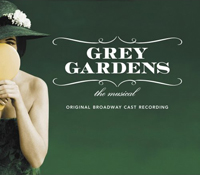 How to Transfer an Off-Broadway Show to Broadway. I was not among the enamored who stormed the doors of Playwrights Horizons multiple times in the spring and summer of 2006 to see Grey Gardens, primarily because of star Christine Ebersole who was anointed in ways that would have made Hugh Jackman (The Boy From Oz) blush. During my one and only viewing, the show struck me as a well-intentioned curiosity that didn't live up to the potential of writers Scott Frankel (music), Michael Korie (lyrics), or Doug Wright (book) or its larger-than-life subjects, Edith Bouvier Beale and her daughter "Little Edie" Beale. So when it was announced that the show was moving to Broadway, I was nonplussed: Why did anyone think a show acclaimed solely for its stars—neither of whom is a household name— would stand a chance on Broadway? Now that Ebersole and her co-star Mary Louise Wilson have both won Tony Awards and the show is ramping up toward its closing this Sunday, I still can't answer that question.
How to Transfer an Off-Broadway Show to Broadway. I was not among the enamored who stormed the doors of Playwrights Horizons multiple times in the spring and summer of 2006 to see Grey Gardens, primarily because of star Christine Ebersole who was anointed in ways that would have made Hugh Jackman (The Boy From Oz) blush. During my one and only viewing, the show struck me as a well-intentioned curiosity that didn't live up to the potential of writers Scott Frankel (music), Michael Korie (lyrics), or Doug Wright (book) or its larger-than-life subjects, Edith Bouvier Beale and her daughter "Little Edie" Beale. So when it was announced that the show was moving to Broadway, I was nonplussed: Why did anyone think a show acclaimed solely for its stars—neither of whom is a household name— would stand a chance on Broadway? Now that Ebersole and her co-star Mary Louise Wilson have both won Tony Awards and the show is ramping up toward its closing this Sunday, I still can't answer that question.
However, comparing PS Classics's recording of the Broadway version to its Off-Broadway counterpart (reviewed here) reveals how serious the creators were about improving for the move: There's not a single change evident that's not for the better. That begins (most crucially) with the casting of Erin Davie, who replaced Sara Gettelfinger in the role of Edie in 1941 and brings a much more convincing voice and manner to the role of the disturbed, soon-to-be-deflated socialite and is considerably more apt alter-ego for Christine Ebersole. New first-act songs "The Girl Who Has Everything," "Goin' Places," and "Marry Well" are excellent substitutes for the originals that better capture the sad, fractured irony of the society-addicted Bouvier family coming apart at the seams. A number of tracks have been reused from the Off-Broadway recording, so if you think things sound familiar, you're right. But Frankel and Korie's Cole Porter Fringe score improves somewhat on multiple listenings, so you'll have to get used to it to get the most out of Grey Gardens. The show will be better remembered for its star turns than for anything it actually says (it doesn't say much), but the Broadway recording makes a far better case for the show as a work of art, if a tarnished one.
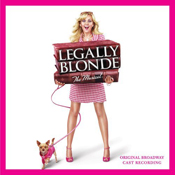 Eighteen Ways to Cure Insomnia as Loudly as Possible. In the annals of musical theatre, there have surely been worse scores than Laurence O'Keefe and Nell Benjamin's for Legally Blonde, but you'll have to work to find one more boring. Having seen his Bat Boy and their Sarah, Plain and Tall, I remain astonished that such gifted young artists could turn out songs as assaultingly awful as those in the show that the new Sh-K-Boom recording preserves. Nearly every one is a stop-the-show-or-bust ear-splatterer, and the ones that aren't are insipid enough to be practically contemptible. Laura Bell Bundy's belting in the sorority-girl-turned-Harvard-Law-upstart lead role is accomplished but passionless, leading man Christian Borle's sense of humor shines through his sub-par material, and Kate Shindle gets five seconds of terrific air time in the title track. But finding much else of worth in this entirely extractable score isn't worth the effort. Your time and money would be better spent renting the charming 2001 film (starring Reese Witherspoon) on which this soporific enterprise is based.
Eighteen Ways to Cure Insomnia as Loudly as Possible. In the annals of musical theatre, there have surely been worse scores than Laurence O'Keefe and Nell Benjamin's for Legally Blonde, but you'll have to work to find one more boring. Having seen his Bat Boy and their Sarah, Plain and Tall, I remain astonished that such gifted young artists could turn out songs as assaultingly awful as those in the show that the new Sh-K-Boom recording preserves. Nearly every one is a stop-the-show-or-bust ear-splatterer, and the ones that aren't are insipid enough to be practically contemptible. Laura Bell Bundy's belting in the sorority-girl-turned-Harvard-Law-upstart lead role is accomplished but passionless, leading man Christian Borle's sense of humor shines through his sub-par material, and Kate Shindle gets five seconds of terrific air time in the title track. But finding much else of worth in this entirely extractable score isn't worth the effort. Your time and money would be better spent renting the charming 2001 film (starring Reese Witherspoon) on which this soporific enterprise is based.
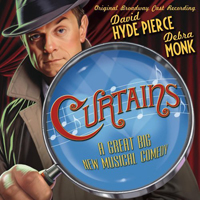 How a Career that Starts with a Bang Can Go Out With a Whimper. John Kander and Fred Ebb were once at the forefront of musical theatre innovation, creating scores for shows like Cabaret and Chicago that pushed musical theatre to its most theatrical limits. So why are their later scores drowned in traditionalism almost to a fault? I didn't understand it with Steel Pier (1997), I didn't understand it with All About Us, and I don't understand it with Curtains. Granted, the circumstances here were unusual, in no small part because lyricist Ebb died (in 2004) before it was completed, leaving composer Kander and then-librettist Rupert Holmes to finish it on their own. But it's still lesser work notable only because of Kander and Ebb's involvement.
How a Career that Starts with a Bang Can Go Out With a Whimper. John Kander and Fred Ebb were once at the forefront of musical theatre innovation, creating scores for shows like Cabaret and Chicago that pushed musical theatre to its most theatrical limits. So why are their later scores drowned in traditionalism almost to a fault? I didn't understand it with Steel Pier (1997), I didn't understand it with All About Us, and I don't understand it with Curtains. Granted, the circumstances here were unusual, in no small part because lyricist Ebb died (in 2004) before it was completed, leaving composer Kander and then-librettist Rupert Holmes to finish it on their own. But it's still lesser work notable only because of Kander and Ebb's involvement.
The idea of a murder mystery set amid a foundering Boston tryout of a Broadway musical, with the investigating detective solving both dilemmas, is not a bad one. And, onstage at the Hirschfeld, Holmes's book crackles with clever comedy, superb pacing, and sharp dialogue befitting the best of contemporary musical comedy books. But the songs don't hold up their end of the bargain, wavering between musical theatre cheerleading ("Show People"), backstage bitching ("What Kind of Man"), diegetic numbers far too good at painting the Robbin' Hood musical as a show in dire straits, and character songs with all the bite of marshmallow fluff. Some casting is excellent: David Hyde Pierce provides a flawless rendition of the reluctant-leading-man police officer, Debra Monk is a belty delight as a nail-hard matron of a producer, and Edward Hibbert is a riot as the acidic director. Other performers make weaker impressions, most notably Karen Ziemba and Noah Racey as the leads in the show-within-a-show who wouldn't have survived past the second row in the show's era (1959) when charisma was king. But nearly every strain of Kander melody, with a lyric from Ebb, Holmes, or his own hand, reminds you that a man once dedicated to expanding boundaries is now far too content at operating within them.
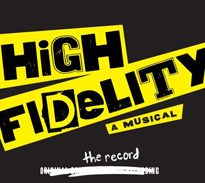 The Importance of Out-of-Town Tryouts. High Fidelity was one of the season's saddest failures, a two-week tragedy that had everything going for it except time. Several decades ago, a show like this one would be afforded two or three tryout stops to work out the kinks with a difficulty property (Nick Hornby's novel, and the ensuing film, about growing up and growing into love), and could well have come to Broadway a hit. This one had but one tryout stop, in Boston, where (I'm told) not too many changes were made. It limped into New York, played some previews, then died in December after 13 performances, despite some of the most distinctive musical work of the season from composer Tom Kitt and lyricist Amanda Green. (The book, by David Lindsay-Abaire, was at best adequate.)
The Importance of Out-of-Town Tryouts. High Fidelity was one of the season's saddest failures, a two-week tragedy that had everything going for it except time. Several decades ago, a show like this one would be afforded two or three tryout stops to work out the kinks with a difficulty property (Nick Hornby's novel, and the ensuing film, about growing up and growing into love), and could well have come to Broadway a hit. This one had but one tryout stop, in Boston, where (I'm told) not too many changes were made. It limped into New York, played some previews, then died in December after 13 performances, despite some of the most distinctive musical work of the season from composer Tom Kitt and lyricist Amanda Green. (The book, by David Lindsay-Abaire, was at best adequate.)
"She Goes" is an infectious dissection of the male breakup aesthetic, "Number 5 With A Bullet" is a hard-rock denial session with a throbbing beat, "Nine Percent Chance" hilariously brings together in one song the show's three competing social storylines, and "The Last Real Record Store On Earth," is one of the best opening numbers in years, with so much intense, pounding energy that the losers singing it compel you to fall in love with their secret retail hangout. These songs are so good that it's pretty easy to forgive the also-rans that make up most of the rest of the score, numbers that could easily have been tweaked or replaced had the writers been able or willing to do so on the road. It's clear that everyone had the right ideas in mind, and the show's variety of rock pastiche is skillfully explored, but the proper execution never surfaced.
Hopefully Kitt and Green haven't given up on High Fidelity altogether; time, with the help of this recording, could well vindicate the show and give it another shot at success. Sadly, this Sh-K-Boom recording is markedly flat, and conveys little of the immediacy the show packed in the theatre; the performances, too, especially from Will Chase and Jenn Colella, are tentative here in a way they simply weren't at the Imperial. It's too bad High Fidelity couldn't have gotten the explosive recording it deserved, but if the show gets a second life it will be because people will be able to hear how good this score was.
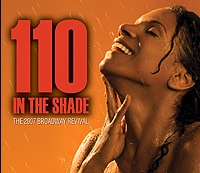 How to Revive a Musical Properly and Economically. Lovers of classic shows seldom get revivals on Broadway that can seriously be called the equals of the originals. They're almost always scaled down and/or rethought into absolute nonsense, with the needs of the show usually given last, or no, consideration. But when it came to 110 in the Shade, the Roundabout Theatre Company proved it was possible to mount a pinch-penny production of the N. Richard Nash-Harvey Schmidt-Tom Jones show and retain all its power and emotional scope. The PS Classics recording of the revival documents this beautifully.
How to Revive a Musical Properly and Economically. Lovers of classic shows seldom get revivals on Broadway that can seriously be called the equals of the originals. They're almost always scaled down and/or rethought into absolute nonsense, with the needs of the show usually given last, or no, consideration. But when it came to 110 in the Shade, the Roundabout Theatre Company proved it was possible to mount a pinch-penny production of the N. Richard Nash-Harvey Schmidt-Tom Jones show and retain all its power and emotional scope. The PS Classics recording of the revival documents this beautifully.
Stunning at the center is four-time Tony Award winner Audra McDonald, giving one of the brashest, most go-for-broke performances of her career as Lizzie Curry, a plain country girl who unwittingly becomes caught between financial security (the local lawman, File, played by Christopher Innvar), and sexual adventure (traveling rainmaker Starbuck, played by Steve Kazee). From latent hope to utter despair and finally full bloom, McDonald captures all of Lizzie's conflicting emotions and filters them through her flawless soprano, sounding as heartbreaking in the lacerating "Old Maid" as she does showstopping in "Raunchy." She receives first-tier support from Innvar, John Cullum as her father, and Chris Butler and Bobby Steggart as her brothers, though Kazee lacks the dangerous daring so necessary for Starbuck.
Beyond the casting are Jonathan Tunick's smart orchestral reductions, which highlight all the country colors of Schmidt's music, and Lonny Price's direction, which has helped everyone on the recording invest their portrayals with such life that you don't miss a nuance of the action. The recording itself has been lovingly rendered, giving you more than enough of Nash's trenchant dialogue (based uncommonly closely on his play, The Rainmaker) to follow this captivating story from beginning to end.
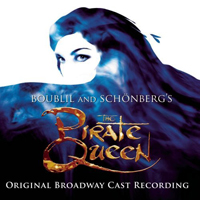 When to Know Enough's Enough. So many people were so sick of the pop opera—or had their appetites satiated by the revival of Les Misérables that no one noticed The Pirate Queen, the new show from those writers (Alain Boublil and Claude-Michel Schönberg) wasn't that bad. It only ran 85 performances on Broadway, but left behind a cast recording to forever stand as one of the most curious artifacts of one of the most curious anachronisms in years. The Sony Classics disc reveals a show with its share of gorgeous melodies, weak lyrics, and the unmistakably musty air of 1989.
When to Know Enough's Enough. So many people were so sick of the pop opera—or had their appetites satiated by the revival of Les Misérables that no one noticed The Pirate Queen, the new show from those writers (Alain Boublil and Claude-Michel Schönberg) wasn't that bad. It only ran 85 performances on Broadway, but left behind a cast recording to forever stand as one of the most curious artifacts of one of the most curious anachronisms in years. The Sony Classics disc reveals a show with its share of gorgeous melodies, weak lyrics, and the unmistakably musty air of 1989.
The best reason to take the cast recording for a spin is the forceful performance of Hadley Fraser. A newcomer (and likely one-timer) on these shores, he brings real dynamism to the watery part of Tiernan, lover of the title character Grace O'Malley. Unfortunately, the uniter of the disparate Irish tribes herself—who caught the eye and ear of British monarch, Queen Elizabeth I (for which Linda Balgord provided the most bizarre, quasi-camp characterization of the season)—is played by Stephanie Block as an all-out beltaholic. Her bombastic style perfectly fits the score's power-folk mold, but doesn't capture the same desparate, sexual energy that Fraser's more outwardly restrained vocals do. He's especially good in the absurdly radioactive throat-buster ballad "I'll Be There," making a must-listen moment from a song that helped hammer the final nails in the coffin of the entire genre.
Still, compared to the last Boublil-Schönberg debacle to hit America, Martin Guerre, The Pirate Queen is several steps ahead in quality and several miles behind in ridiculousness. The show looked great, sounded fine, and captured a definite (if overblown) honesty missing from most of the season's hits. Had it opened 15 ago, it might have eked out a run of two or three seasons by riding on the wave of the British invasion's popularity. But while The Pirate Queen was far from problem-free, its biggest problem was its inability to overcome the simple fact that its time was just past.
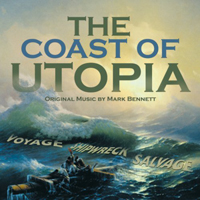 Make a Play—or Three—Feel Like a Musical. The theatrical event of the season—perhaps the decade—was The Coast of Utopia, Tom Stoppard's brilliant trilogy depicting the national and personal revolutions of a group of Russian friends over the course of several 19th-century decades. While intelligent and engrossing, it also offered a compelling musical component in Mark Bennett's swirling soundscape score, which underscored both the playfulness and import of the wheels turning and the castles burning. Ghostlight Records has recorded that score, and the resulting disc is a fascinating and listenable study of musical dramatism that most of the other artists whose shows we've observed here would do well to observe.
Make a Play—or Three—Feel Like a Musical. The theatrical event of the season—perhaps the decade—was The Coast of Utopia, Tom Stoppard's brilliant trilogy depicting the national and personal revolutions of a group of Russian friends over the course of several 19th-century decades. While intelligent and engrossing, it also offered a compelling musical component in Mark Bennett's swirling soundscape score, which underscored both the playfulness and import of the wheels turning and the castles burning. Ghostlight Records has recorded that score, and the resulting disc is a fascinating and listenable study of musical dramatism that most of the other artists whose shows we've observed here would do well to observe.
Familiarity with the story will help a great deal and only amplify the impact of Bennett's music, but you don't need to have run the Marathon (or any of its three individual legs) to be transported. All you need are five tracks: the "Trilogy Prologue," the three finales, and the rousing curtain call to get your money's worth. Bennett's work superbly complements Stoppard, and serves as an invigorating reminder that the fun and excitement of Broadway compositions are never limited strictly to musicals.
Why are you looking all the way down here?
For more articles by Matthew Murray, click the links below!
Previous: Show Business
Next: Let's Put on a Show! Okay, so Which One?
Or go to the Archives
[Broadway Ad Network]
[Broadway Ad Network]

If you would like to contact us, you can email us at feedback@
broadwaystars.com
[Broadway Ad Network]
[Broadway Ad Network]

- July 15: Harry Connick, Jr. in Concert on Broadway - Neil Simon
- Sept. 28: Brief Encounter - Studio 54
- Sept. 30: The Pitmen Painters - Samuel J. Friedman Theatre
- Oct. 3: Mrs. Warren's Profession - American Airlines Theatre
- Oct. 7: Time Stands Still - Cort Theatre
- Oct. 12: A Life In The Theatre - Schoenfeld Theatre
- Oct. 13: Bloody Bloody Andrew Jackson - Bernard Jacobs Theatre
- Oct. 14: La Bete - The Music Box Theatre
- Oct. 21: Lombardi - Circle In The Square
- Oct. 25: Driving Miss Daisy - John Golden Theatre
- Oct. 26: Rain - A Tribute To The Beatles On Broadway - Neil Simon Theatre
- Oct. 31: The Scottsboro Boys - Lyceum Theatre
- Nov. 4: Women On The Verge Of A Nervous Breakdown - Belasco Theatre
- Nov. 9: Colin Quinn Long Story Short - Helen Hayes Theatre
- Nov. 11: The Pee-Wee Herman Show - Stephen Sondheim Theatre
- Nov. 13: The Merchant of Venice - The Broadhurst Theatre
- Nov. 14: Elf - Al Hirschfeld Theatre
- Nov. 18: A Free Man Of Color - Vivian Beaumont Theater
- Nov. 21: Elling - Ethel Barrymore Theatre
- Dec. 9: Donny & Marie: A Broadway Christmas - Marquis Theater
- Jan. 13: The Importance of Being Earnest - American Airlines Theatre
- Mar. 3: Good People - Samuel J. Friedman Theatre
- Mar. 6: That Championship Season - Bernard B. Jacobs Theatre
- Mar. 11: Kathy Griffin Wants a Tony - Belasco
- Mar. 17: Arcadia - Barrymore Theatre
- Mar. 20: Priscilla Queen Of The Desert The Musical - The Palace Theatre
- Mar. 22: Ghetto Klown - Lyceum Theatre
- Mar. 24: The Book Of Mormon - Eugene O'Neill Theatre
- Mar. 27: How To Succeed In Business Without Really Trying - Al Hirschfeld Theatre
- Mar. 31: Bengal Tiger at the Baghdad Zoo - Richard Rodgers Theatre
- Apr. 7: Anything Goes - Stephen Sondheim Theatre
- Apr. 10: Catch Me If You Can - The Neil Simon Theatre
- Apr. 11: The Motherf**ker with the Hat - Gerald Schoenfeld Theatre
- Apr. 14: War Horse - Vivian Beaumont Theater
- Apr. 17: Wonderland: A New Alice. A New Musical Adventure. - Marquis Theatre
- Apr. 19: High - Booth Theatre
- Apr. 20: Sister Act - The Broadway Theatre
- Apr. 21: Jerusalem - Music Box
- Apr. 24: Born Yesterday - Cort Theatre
- Apr. 25: The House of Blue Leaves - Walter Kerr Theatre
- Apr. 26: Fat Pig - Belasco Theatre
- Apr. 27: Baby It's You! - Broadhurst Theatre
- Apr. 27: The Normal Heart - Golden Theater
- Apr. 28: The People in the Picture - Studio 54
- Apr. 28: The End of The Season
- Jun. 12: The 65th Annual Tony Awards - Beacon Theatre
- June 14: Spider-Man, Turn Off The Dark - Foxwoods Theater
- June 21: Master Class - Samuel J. Friedman
